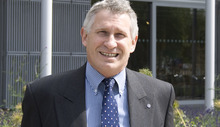Swindon businesses could be forgiven for feeling a little left out of the Budget as investment was steered more towards big cities and other regions, according Swindon & Wiltshire Initiative director Ian Larrard.
But the town should benefit in the longer term from measures to improve education, skills and the digital economy, he said.
This was particularly relevant in areas such as support for alternative fuels for cars and boosts to the UK’s tech industry – both key sectors of Swindon’s economy. 
“Having announced a number of investment plans for cities such as Birmingham and Manchester, and regions including South West Wales and North East, [Chancellor] Phillip Hammond confidently declared that his government is ‘delivering for every region in Britain’,” said Mr Larrard.
“What with so many ambitious regional development plans put on the table, Swindon businesses can be forgiven for feeling a little bit left out of the Chancellor’s Budget – a handful of national focussed investments aside.
“While stamp duty will no doubt hit the headlines, perhaps the most positive message from government as far as Swindon is concerned is its commitment to a raft of measures to improve education, skills and the digital economy.
“The Chancellor said he wanted a new tech business to start every half an hour in Britain. If such an ambition were to become a reality – a few measures were mentioned that could help stimulate this – Swindon could benefit tremendously.”
As home to a number of large hi-tech companies, with its prime location on the M4 tech corridor and a burgeoning entrepreneurial community aided by developments such as the Carriageworks tech incubator, Swindon was well and truly geared up to take advantage of the digital age, he said.
“Equally as important is the government’s recognition of the skills investment required to facilitate such growth. Working with employers on the apprenticeship levy, pledging extra support for further education colleges to implement T-Levels and a push on maths are all a step in the right direction that could have a direct benefit on youth unemployment in the town,” said Mr Larrard.
“Plans to work hand in hand with industry to get more computer scientists in schools, could also help give local education providers a much-needed boost.
“On a final note, measures to promote the use of electric cars, while not only benefitting air quality, should also play to one of our town’s emerging engineering strengths.
“We all know the great contribution that Honda and BMW have made in the town, but our involvement in the future of electric vehicles has gone somewhat under the radar.
“We’re home to Hydrogen Hub, an industry-led community of stakeholders from across the hydrogen and fuel cell supply chain. We have state-of-the-art battery refuelling stations at Honda and shortly Johnson Matthey. We also have one of the biggest fleets of fuel cell cars per head of population. Furthermore, production of the new electric Mini will start in Swindon and Oxford in 2019.
“So, despite the lack of direct investment that some regions will benefit from, there were a number of new announcements that could work in Swindon’s favour in the medium and long-term.”
The Swindon & Wiltshire Initiative is run by Business West, the region’s largest business organisation.
Richards Mathews, CEO of Swindon-based professional services firm Optimum, welcomed the announcement that the VAT registration threshold will not be lowered as good news for small businesses.
He also said: “As always, we need to see the detail but there were one or two pieces of good news, for example investment in electric vehicles and the well documented plastic tax.
“It was good to hear Mr Hammond talk about SMEs as an important part of the economy.”
Optimum was formed recently through the merger of accountancy firm Regulatory Accounting with Swindon law firm Hoffman Briggs.














